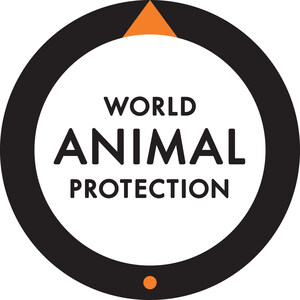NEW YORK, Sept. 24, 2018 /PRNewswire/ -- Alarming evidence released today by World Animal Protection reveals a deadly trade of jaguar body parts being trafficked illegally for use in traditional Asian medicine from the South American country of Suriname.
The majestic big cats, known for their elaborate markings, are being poached and processed to be exported to China. The process involves boiling down their bodies for up to a week until it turns into a glue or treacle-like paste, sold on the black market in tubs, and until now, has been undocumented. The product is used in the belief that it can be used to treat arthritis pain, sexual performance and to enhance health, despite the fact that there are proven alternatives readily available.
Images collected show the lifeless body of a jaguar tied up from its feet, hanging from a wooden pole upside down; another image shows a girl standing next to another slaughtered jaguar, posing shamelessly for the camera with a grin. Video footage shows a dead male jaguar fastened down onto a small tractor.
This shocking cruel practice involves jaguars being stalked and shot numerous times, suffering multiple injuries, until eventually they are killed, usually with a final bullet to the head once they are too injured to move. In one instance, it was reported that the jaguar had to be shot seven times until it died, causing prolonged suffering.
Investigators from World Animal Protection also captured interviews with rangers and discussions with poachers and the traders who are putting orders for a jaguar on social media, by phone, or through their personal networks. The sale of the jaguar paste is a lucrative business with a zealous market – a driving factor given that almost half of the population of Suriname lives in poverty1 and a jaguar is considered to some miners to be worth around 20 grams of gold.
In addition, there is evidence of jaguar cubs being taken from the wild and sold – often to wealthy businessmen keeping them as status symbols and not knowing how to take care of them. They are fed cow's milk or sugar water, which is an entirely unsuitable diet. Sources say they live their lives in cages, until they are too big to look after and at times they are killed to eat, as their meat is also consumed among Suriname's Chinese population.
Nicholas Bruschi, Investigations Advisor at World Animal Protection, said:
"This investigation has uncovered a shocking underground trade exploiting an iconic animal of the South American rainforests in a barbaric way for unproven traditional Asian medicine."
"Jaguars already face the challenges of habitat destruction and human animal conflicts. They are now cruelly and needlessly killed, left to die agonizing deaths. It is extremely sad news for these incredible big cats whose numbers are already in decline. And, while jaguar cubs might seem very cute, they are still wild animals and belong in the wild, not in the illegal pet trade."
It's estimated that there are approximately 173,0002 jaguars left in the wild, and they are classed as 'near threatened' according to the IUCN (International Union for Conservation of Nature) list. It is also thought that jaguars, like other big cats, are being used as a supplement product for traditional Asian medicine to their relative, the tiger, sparking a worrying trend that could see their numbers plummet.
With more mining and logging resulting in loss of habitat and increased human wildlife conflicts, jaguars are becoming more visible and are being targeted for taking livestock. Habitat loss also makes it easier for opportunist poachers and organized mafia gangs to source jaguars in the wild.
World Animal Protection works tirelessly to prevent cruelty to animals around the world. Jaguar poaching for traditional Asian medicine has, to date, been relatively under the radar. To tackle the issue, World Animal Protection will be cooperating with Suriname's rangers and specialist NGOs on tangible solutions and sharing intelligence to prevent poaching. We are raising awareness of the issue, in the hope that the Suriname government will put greater enforcement within their borders to stop poaching, but also prevent the smuggling of the product out of the country.
Notes to the editor:
- Watch the undercover videos of the jaguar trade here.
- Read the full report on the cruel exploitation of jaguars here.
- Undercover b-roll footage and images available here. Images credit World Animal Protection confidential source.
- Across Latin America, World Animal Protection research has previously explored how the Amazon's iconic animals are being exploited for use as tourist photo props. This 2017 report, "A close-up on cruelty" can be accessed here.
Additional country and environment info:
- Suriname is the smallest country in South America, bordering French Guiana to the east, Guyana to the west, Brazil to the south and has a coastline bordering the Atlantic Ocean to the north.
- Suriname is home to one of the earth's largest tracts of pristine tropical rainforest3.
- The jaguar is classified by all countries of the Guianas as being endangered and thus in need of protection. This means that it is illegal to target and hunt the species, whether for export, recreation, the domestic pet trade, or for bushmeat. There are only a few exceptions where special provisions are made for capture and shipment for education, exhibition and research to zoological parks, museums and wildlife reserves.
1http://hdr.undp.org/sites/default/files/Country-Profiles/SUR.pdf
2https://journals.plos.org/plosone/article/file?id=10.1371/journal.pone.0194719&type=printable
3https://www.theguardian.com/travel/2009/may/02/surinam-eco-rainforest-holiday
SOURCE World Animal Protection
Related Links
http://www.worldanimalprotection.us
WANT YOUR COMPANY'S NEWS FEATURED ON PRNEWSWIRE.COM?
Newsrooms &
Influencers
Digital Media
Outlets
Journalists
Opted In





Share this article